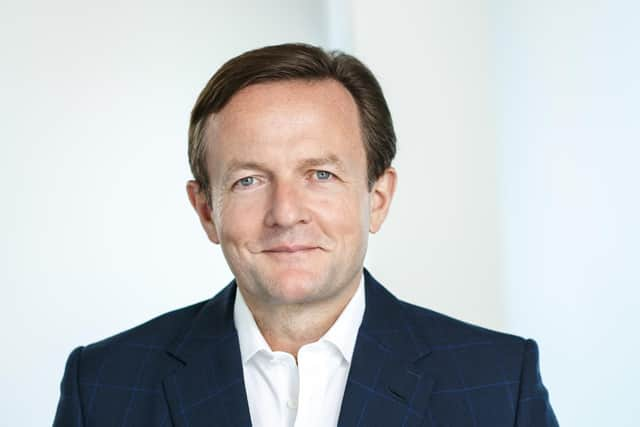Saxo UK boss Charles White-Thomson details the eventful path to his current role - including roles as platoon commander and entrepreneur
and live on Freeview channel 276
I’ve held my current role for just over two years, and Scotland is a very important area both for the firm and for me personally. My family tree in Scotland has been traced back hundreds of years, and includes a Neale Thomson, who was around in Glasgow in the 19th century. The thing I like about him is his philanthropy, and he just seemed to be ahead of his time, for example he built houses for his workers, and he was concerned about their diet so he set up this amazing Crossmyloof Bakery.
He later sold his estate to the local council for less than he paid for it – and it’s now known as Queen’s Park. I'm very proud of him. Nicola Sturgeon has even highlighted his story – calling him a “philanthropist and champion of workers’ rights”.
Advertisement
Hide AdAdvertisement
Hide AdMy family has been involved in the military for a long time – for example my great-great-great uncle was killed in the Charge of the Light Brigade in 1854, fighting the Russians in Crimea. The battle was famously commemorated in the poem of the same name by Lord Tennyson.
I pursued a military career myself, and after I left school, I joined the Army and was commissioned into the Grenadier Guards, and was based in Germany. Then in 1991, when Saddam Hussein invaded Iraq, the Grenadiers were broken up into companies, and we got attached to the Royal Scots. I was in the Queen's Company, which most recently carried Queen Elizabeth’s coffin, and we moved to join the 14/20th Royal Hussars during the Gulf War’s 100 hours’ conflict. It was all pretty hairy, but it was exciting.
Formative
I was a platoon commander at the age of about 20 – you arrive at your battalion, and you’re in charge of 30 people – you grow up pretty quickly. Even now I feel like the military is with me every day. I then joined Barings Bank, which the following year went bust on the back of Nick Leeson's unauthorised trading in Singapore in derivatives. I started there making tea and collecting faxes – and I think that's a really good way to start, you earn your stripes. You're on the trading floor, and learning, and then one day, someone said to me, “that's your desk”.
But over one weekend, this organisation that was about 300 years old was brought down by a rogue trader, and that's had an impact on me. It really made me realise that people who are responsible for banks need to manage their risk and to have control. Now, at Saxo UK, I'm responsible for a financial business, and I want it to grow a lot.


Advertisement
Hide AdAdvertisement
Hide AdAfter Barings I worked for an American investment bank, which then got bought by Credit Suisse, so by now I'd experienced a war, a bankruptcy and a takeover. In this role my team opened up emerging Europe and Russia to all institutional investors, so we were travelling around Russia pretty early on in the 1990s – it was very austere. I think my time in the military taught me well for that, because there's a saying that the first casualty of war is the plan. Sometimes on these trips not everything would go according to plan, and you'd have to adjust it.
Change
Then in 2015, I found myself thinking about wanting to do something else professionally – I’d done 17 years at Credit Suisse and just wanted a change. My wife Louisa and I over lunch one day decided we'd set up an interior design business – which we did, and called it The Lost Corner. I’d gone from running a big distribution desk at a large investment bank to running a small business where one day you're the plumber or electrician, and the next you're the marketer. You learn a lot when you run a small business, in fact you learn a lot about yourself – it's very hard work, and it's definitely part of who I am now because I can see things from both sides.
Then I flew into the Saxo “orbit”, and joined the Danish-headquartered group’s board in the UK, later becoming chairman. A key priority for me is empowering the retail investor. I'm very keen that they understand all the gears in their portfolio and how to manage risk. What worked in the last ten years is unlikely to work in the next ten. We've had all of this free money, this quantitative easing, the interest rate cuts and so on – what I’ve termed “nanny finance”, a term that has now become popular. Investors are always waiting for someone else to bail them out – but while in life there should always be a safety net for the most vulnerable, I am keen to see people being trained to stand on their own two feet financially.


Education
Also, I don't understand why finance has invented a language that is not inclusive and overly complex, and for some reason or other people don't like to talk about money, but it’s extremely important. Financial education at school is so crucial, things like the cost of borrowing on credit cards, and day-to-day budgeting, for example.
Advertisement
Hide AdAdvertisement
Hide AdAt Saxo our platform has 40,000 instruments on it, and the group as a whole has 800,000 clients. I think my responsibility here is the commercial direction of the firm and to run a controlled and well-managed business, so it's about getting the balance between those two. I use sporting analogies a lot, and if you look at a rugby team, it’s made up of loads of different strengths, all sorts. I think it’s the same for business. When it comes to bringing new people into my team, the thing that's important to me is that, to use the rugby analogy, they can kick off both feet and pass with both hands, so that they're versatile and that they can grow with the business.
I'm really interested in growing our footprint in Scotland. We recently presented to the Edinburgh University Trading & Investment Club, and we’re now going to sponsor it. In terms of the economic outlook, there are certainly challenges, but it’s not all doom and gloom – every day brings a new opportunity. And I think investors who prepared for the next period will be able to operate well and make good returns, so it's exciting – it’s a call to arms.
Comment Guidelines
National World encourages reader discussion on our stories. User feedback, insights and back-and-forth exchanges add a rich layer of context to reporting. Please review our Community Guidelines before commenting.